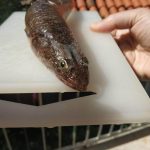New fishing regulations have been introduced in the Jabuka Pit (Jabučka kotlina), the waters around Jabuka island
Starting from September 1, fishing is officially forbidden in the Jabuka Pit for the next three years, including sports and recreational fishing, reports Slobodna Dalmacija. Scientists from Croatia and Italy have united to propose the new regime in order to help protect the most sensitive area in the Adriatic, one that is crucial for further reproduction and survival of important saltwater species.
Professor Alen Soldo Ph.D., Vice Rector at the University in Split, called any kind of fishing regulation in the said area “a good thing”.
“Up until this moment, we have never monitored fishing activities in the Exclusive Economic Zone, and I hope this is only the beginning of some order getting introduced”, Soldo said, adding he also hopes this marks the start of tangible protection of the area. “Every expert out there has commented on the need for an overall ban on fishing in that section due to one important reason: the Jabuka Pit is the largest hatchery of traditional Adriatic species, such as shrimp, hake, and squid. Another reason is the protection of the Adriatic according to EU guidelines, in order to avoid any possible conflict with foreign fishermen in our territorial waters – especially the Italians. This decision will also enable us to rationally approach using the fish stocks. The protected species will now have enough time to replenish and grow in numbers, finding their way back to our territorial waters”, said Soldo.
Minister of Agriculture Tomislav Tolušić stated that the Adriatic Sea is deserving of special attention and special regulations. “We have been advocating for our needs and for protection of our fish and our fishermen for a long time. We wish to retain this principle of fishing effort management, and we don’t want to introduce a system of quota, as we consider our approach to be more effective when it comes to protecting our fish stocks and the European fishing areas in general”, he said.
The ban will also affect the local fishermen, but they fully support the initiative. “It’s an excellent decision! I mean, we’ve seen the first results of control measures in hake fishing after only six months”, said Damir Karuza, representative of fishermen of Vis island at the Croatian Chamber of Trades and Crafts. He, too, considers the controlled fishing to be a better measure of protection than a quota system.
As the waters of the Jabuka Pit partially fall under jurisdiction of the Republic of Croatia, while the rest is part of the open waters of the Adriatic, it was necessary for Croatian and Italian administrative bodies to collaborate. “It’s a fantastic decision, banning all fishing for three years, as we’ve already seen fish stocks restoring substantially in a single year. However, it wouldn’t be of much worth to ban fishing if the Italian neighbours kept overfishing in the area. That’s why this is such a good regime, an excellent agreement between us and the Italians”, said Antonio Šunjić, representative of fishermen of Split-Dalmatia County.








